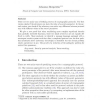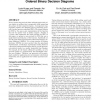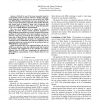84 search results - page 12 / 17 » On the Security Loss in Cryptographic Reductions |
POPL
2001
ACM
14 years 7 months ago
2001
ACM
We study the interaction of the "new" construct with a rich but common form of (first-order) communication. This interaction is crucial in security protocols, which are ...
ENTCS
2006
13 years 7 months ago
2006
There are two main ways of defining secrecy of cryptographic protocols. The first version checks if the adversary can learn the value of a secret parameter. In the second version,...
CCS
2005
ACM
14 years 19 days ago
2005
ACM
We describe a new encryption technique that is secure in the standard model against adaptive chosen ciphertext (CCA2) attacks. We base our method on two very efficient Identity-Ba...
CCS
2006
ACM
13 years 10 months ago
2006
ACM
Privacy-preserving protocols allow multiple parties with private inputs to perform joint computation while preserving the privacy of their respective inputs. An important cryptogr...
CSFW
2009
IEEE
13 years 11 months ago
2009
IEEE
ProVerif is one of the most successful tools for cryptographic protocol analysis. However, dealing with algebraic properties of operators such as the exclusive OR (XOR) and Diffie-...




